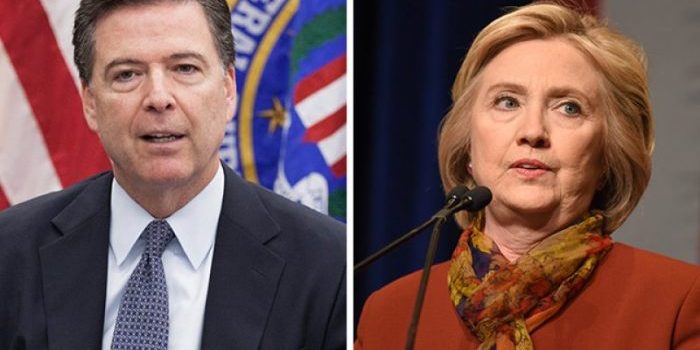The FBI and the Justice Department reportedly were at odds over how to investigate Democratic presidential nominee Hillary Clinton as federal authorities announced they would take a new look at her emails.
The Wall Street Journal, citing people familiar with the matter, reported Sunday that senior law enforcement officials voiced skepticism several times of the strength of the bureau’s investigation into the Clinton Foundation, looked to condense the effort put into the probe and even told agents to limit their pursuit of the case.
The FBI initially started their investigation into the Clinton Foundation to determine whether financial crimes or influence peddling occurred related to the charity.
According to the paper, some investigators grew frustrated with the case and viewed some of the FBI leaders as uninterested. Some others involved in the case disagreed, saying that the FBI’s second-in-command Andrew McCabe was in a fight for control between the Justice Department and the FBI’s probing the foundation.
McCabe started overseeing the case into Clinton’s private email server earlier this year. However, McCabe seemed to be caught in between a rock and a hard place after it was learned last week that his wife Dr. Jill McCabe received more than $465,000 in campaign funds from a political action committee of Virginia Gov. Terry McAuliffe, a longtime Clinton ally and former foundation board member. She was running for an open state Senate seat in November, but lost. FBI officials insist that McCabe had no role in the Clinton email investigation until he was promoted and that by the time he did receive the promotion, his wife’s campaign had already ended.
Those close to the Clinton email probe told the Journal that by the time McCabe even joined the investigation, other Clinton-related probes were well underway and part of a heated internal debate. For months, FBI field offices in Washington Los Angeles, Little Rock, Ark., and New York had been gathering information about the Clinton Foundation and other possible public corruption cases and one tied to McAuliffe. The Journal reported that a presentation of their finding to the Justice Department in February didn’t go well.
“That was one of the weirdest meetings I’ve ever been to,” one person in the meeting said.
Some said that the Justice Department immediately started off skeptical about the whole thing, while others believe the FBI didn’t present enough compelling information about the Clinton Foundation to justify an intensified investigation. FBI officials maintained that they were in their right to pursue more aggressive techniques, while Justice Department officials said they wouldn’t authorities such matters.
After Comey announced that the FBI wouldn’t pursue charges against Clinton in the private email case, McCabe decided to refocus the investigation into the Clinton Foundation and putting the New York office in charge.
Some officials within the FBI believed they would have a more compelling case if they tied the foundation and McAuliffe investigations together. But the Justice Department insisted both cases were weak and “found little that would merit expanded investigative authority.”
According to the Journal, one senior Justice Deparmtent official voiced his displeasure to McCabe that agents from New York were still pursuing the Clinton Foundation case during the election season. A source close to McCabe said the official was “very pissed off.”
Some officials believed the heated exchange showed how McCabe was stuck in the middle of an FBI that was eager to go all out in the Clinton Foundation case and a Justice Department that just wanted to get it over with.
Further down the FBI chain of command, agents painted a darker image. They told the Journal they were ultimately told to “stand down” and weren’t allowed to take a more aggressive pursuit and they heard that the order was coming straight from McCabe himself. However, those familiar with the situation have denied an order like that was ever given.
Investigators were stalled again in September after requesting to search nongovernment laptops in part of the Clinton email investigation. The emails were only allowed to be reviewed with the purpose of investigating possible mishandling of classified information.
Soon after that decision, Comey informed FBI leadership about the contents discovered on former Rep. Anthony Weiner’s laptop, which led to Friday’s letter to House Republicans.
A source told Fox News on Sunday that an analysis of the metadata on Weiner’s computer has turned up “positive hits for state.gov and HRC emails,” which led Comey to revisit the FBI investigation into Clinton using a private email server system while secretary of state. A second law enforcement source confirmed the account.
Officials suggest it will take weeks to determine if the emails included classified information or new information to serve in the Clinton investigation.










